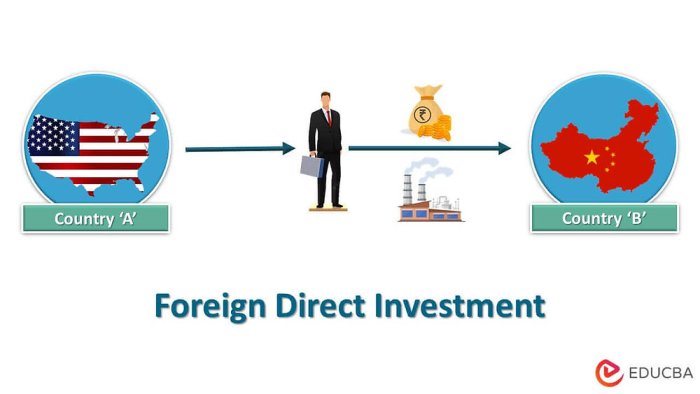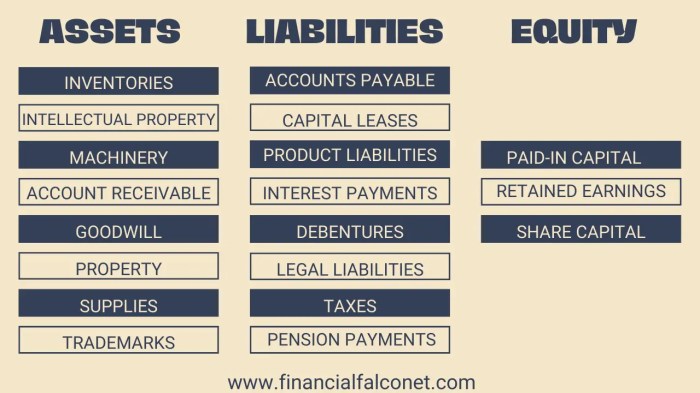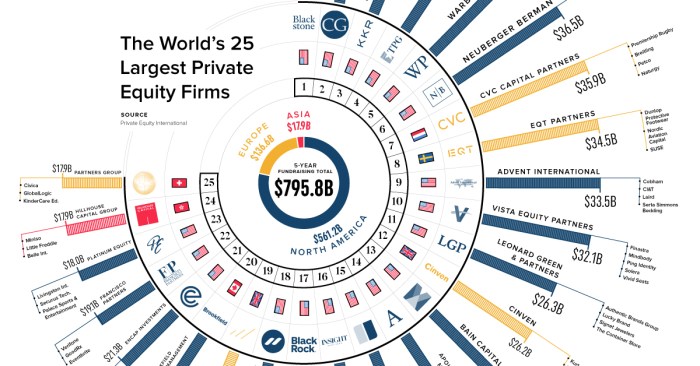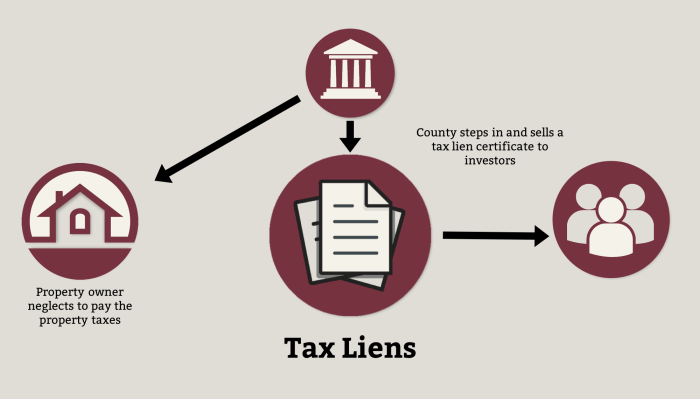Foreign Direct Investment: Shaping Global Economies

Foreign direct investment (FDI) is a powerful force shaping global economies, representing the investment made by companies from one country into another. It goes beyond mere portfolio investment, signifying a long-term commitment to control and manage assets in a foreign nation. This investment can take various forms, including greenfield investments, mergers and acquisitions, and joint ventures, each driven by distinct motivations like market seeking, resource seeking, or efficiency seeking.
FDI plays a pivotal role in economic development, bringing benefits such as job creation, technology transfer, and increased exports. However, it also presents challenges, such as competition with domestic businesses, environmental concerns, and the potential for exploitation. Understanding the nuances of FDI is crucial for policymakers and businesses alike, as it shapes the global economic landscape.
Definition and Types of Foreign Direct Investment (FDI)
Foreign direct investment (FDI) represents a significant driver of economic growth and globalization. It involves long-term investments made by a company or individual in a foreign country, aiming to gain control or influence over an existing business or to create a new one. This distinguishes FDI from portfolio investment, which involves short-term investments in securities like stocks and bonds, without seeking control or influence.
Types of FDI
FDI can take various forms, each with its unique characteristics and implications.
- Greenfield investment involves establishing a new company or facility in a foreign country. This type of FDI allows for greater control over operations and can contribute to local job creation and economic development. For example, Tesla’s Gigafactory in Nevada, USA, is a greenfield investment that has boosted the local economy and created thousands of jobs.
- Mergers and acquisitions (M&A) involve acquiring an existing company or a controlling interest in a foreign firm. This approach allows for immediate access to existing infrastructure, markets, and expertise. A prominent example is the acquisition of the British company ARM Holdings by the Japanese technology giant SoftBank, which provided SoftBank with access to ARM’s advanced semiconductor technology.
- Joint ventures involve two or more companies, from different countries, collaborating to establish a new entity or undertake a specific project. Joint ventures allow for shared risk and expertise, while also providing access to local markets and knowledge. For example, the joint venture between the Chinese company SAIC Motor and General Motors (GM) of the United States has resulted in the production of vehicles for the Chinese market.
Motivations for FDI
Companies invest abroad for various reasons, seeking to gain advantages and maximize returns.
- Market seeking: Companies invest in foreign countries to access new markets and expand their customer base. This is often driven by factors like high growth potential, untapped demand, or strategic positioning within a particular industry. For instance, Apple’s investment in China allows the company to tap into the vast Chinese market for its products.
- Resource seeking: Companies invest abroad to secure access to natural resources like minerals, oil, or gas. This motivation is particularly relevant for industries that rely heavily on specific raw materials. For example, ExxonMobil’s investment in oil and gas exploration in Angola provides the company with access to valuable energy resources.
- Efficiency seeking: Companies invest abroad to reduce production costs, improve efficiency, or gain access to specialized skills and knowledge. This can involve relocating manufacturing operations to countries with lower labor costs or collaborating with foreign partners that possess specific expertise. For instance, many multinational corporations have shifted manufacturing operations to countries like Vietnam and Bangladesh, where labor costs are significantly lower.
Benefits and Challenges of FDI
Foreign direct investment (FDI) is a significant driver of economic growth and development. It plays a crucial role in transferring capital, technology, and skills to host countries, leading to job creation, increased productivity, and improved living standards. However, FDI also comes with potential challenges that require careful consideration and effective management. This section explores the benefits and challenges associated with FDI, focusing on its impact on both developed and developing economies.
Economic Benefits of FDI
FDI brings several economic benefits to host countries, contributing to their overall development and prosperity.
- Job Creation: FDI often leads to the creation of new jobs in various sectors, including manufacturing, services, and technology. These jobs contribute to increased employment opportunities, reduced unemployment rates, and improved household incomes.
- Technology Transfer: FDI can facilitate the transfer of advanced technologies, production processes, and management practices from foreign investors to host countries. This technology transfer can enhance local industries, boost productivity, and foster innovation.
- Increased Exports: FDI can contribute to increased exports by providing access to new markets, improving production efficiency, and enhancing the quality of goods and services. Increased exports can generate foreign exchange earnings, support economic growth, and create new employment opportunities.
- Infrastructure Development: FDI can play a crucial role in developing infrastructure, such as roads, airports, and telecommunications networks. These infrastructure improvements enhance connectivity, facilitate trade, and attract further investment.
- Economic Diversification: FDI can help diversify economies by attracting investment in new sectors and industries. This diversification can reduce reliance on a single sector, making economies more resilient to external shocks.
Challenges of FDI
While FDI offers significant benefits, it also presents potential challenges that need to be addressed.
- Competition with Domestic Businesses: FDI can sometimes create competition for domestic businesses, potentially leading to job losses and market share erosion. This competition can be particularly challenging for small and medium-sized enterprises (SMEs) that may lack the resources to compete with larger foreign companies.
- Environmental Concerns: FDI can sometimes lead to environmental concerns, particularly in industries with high pollution levels or resource extraction activities. It’s crucial to ensure that foreign investors adhere to environmental regulations and adopt sustainable practices.
- Potential for Exploitation: There is a risk of exploitation associated with FDI, especially in developing countries. This can include low wages, poor working conditions, and the displacement of local communities. Governments and stakeholders need to ensure that FDI benefits local communities and promotes fair labor practices.
- Loss of Economic Control: FDI can lead to a loss of economic control, particularly if foreign investors acquire a significant stake in key industries or sectors. This can raise concerns about national sovereignty and the potential for foreign influence over domestic economic policies.
Impact of FDI on Developing Countries
FDI plays a crucial role in the economic development of developing countries. It can contribute to job creation, technology transfer, and infrastructure development, leading to improved living standards. However, FDI can also present challenges, such as competition with domestic businesses, environmental concerns, and the potential for exploitation.
- Positive Effects: FDI can contribute to economic growth, poverty reduction, and job creation in developing countries. It can also facilitate technology transfer, improve infrastructure, and promote economic diversification. For example, FDI in the manufacturing sector can create jobs, boost exports, and improve the competitiveness of local industries.
- Negative Effects: FDI can also have negative effects on developing countries, including increased inequality, environmental degradation, and a loss of economic control. For example, FDI in the mining sector can lead to environmental damage and the displacement of local communities. It’s essential to ensure that FDI benefits local communities and promotes sustainable development practices.
Factors Influencing FDI

Foreign direct investment (FDI) is a complex phenomenon driven by a multitude of factors, including government policies, economic conditions, and political stability. Understanding these factors is crucial for policymakers and businesses alike, as they play a significant role in shaping the flow of FDI across borders.
Government Policies
Government policies play a pivotal role in attracting FDI. Governments can implement various strategies to create a favorable investment environment, including:
- Tax Incentives: Governments often offer tax breaks, such as reduced corporate tax rates, investment tax credits, or exemptions from certain taxes, to entice foreign investors. These incentives can lower the cost of doing business and make a country more attractive to foreign companies.
- Regulatory Frameworks: Clear and transparent regulations are essential for FDI. Streamlined procedures for setting up businesses, obtaining permits, and resolving disputes can attract investors who value predictability and efficiency.
- Infrastructure Development: Adequate infrastructure, such as reliable power supply, transportation networks, and communication systems, is crucial for businesses to operate effectively. Governments can invest in infrastructure to enhance the attractiveness of their countries to foreign investors.
Economic Factors
Economic factors significantly influence FDI decisions. Key considerations include:
- Market Size: Larger markets offer greater potential for sales and profits, making them more attractive to foreign investors. Countries with large populations and growing economies tend to attract more FDI.
- Growth Potential: Investors are drawn to countries with strong economic growth prospects. Factors such as GDP growth, rising consumer spending, and expanding industries can create opportunities for foreign companies.
- Labor Costs: Lower labor costs can be a significant advantage for businesses looking to reduce production expenses. Countries with a skilled workforce and competitive wages can attract foreign investors seeking to manufacture goods or provide services at lower costs.
Political Stability, Corruption, and Legal Systems
Political stability, corruption levels, and the strength of legal systems are crucial for FDI.
- Political Stability: Investors are more likely to invest in countries with stable political environments. Political instability, such as frequent regime changes, civil unrest, or armed conflicts, can deter FDI.
For instance, the political turmoil in Venezuela has significantly discouraged foreign investment in recent years, leading to a decline in economic activity.
- Corruption: High levels of corruption can create uncertainty and increase the risk of legal and financial challenges for foreign investors. Transparency and accountability in government are essential for attracting FDI.
For example, the perception of corruption in some African countries has discouraged foreign investment in sectors such as mining and infrastructure.
- Legal Systems: Strong legal systems, with clear property rights, contract enforcement mechanisms, and independent courts, are vital for protecting foreign investors.
Countries with weak legal systems can create uncertainty and increase the risk of disputes, discouraging foreign investment.
Global FDI Trends: Foreign Direct Investment

Foreign direct investment (FDI) plays a crucial role in global economic development, driving growth, innovation, and job creation. Understanding global FDI trends is essential for policymakers, businesses, and investors alike. This section explores the dynamics of global FDI flows, the impact of globalization and technological advancements, and emerging trends shaping the future of FDI.
Global FDI Flows
Global FDI flows have experienced significant fluctuations over the years, influenced by various factors such as economic conditions, political stability, and technological advancements.
- The United Nations Conference on Trade and Development (UNCTAD) reports that global FDI inflows reached an estimated $1.5 trillion in 2021, a significant increase from the previous year.
- The United States, China, and the United Kingdom are consistently among the top recipients of FDI.
- Developed countries continue to attract the majority of FDI, but developing countries are also experiencing growth in FDI inflows, particularly in emerging markets.
- The COVID-19 pandemic had a significant impact on global FDI flows, causing a sharp decline in 2020. However, FDI rebounded in 2021, reflecting the resilience of the global economy and the increasing importance of FDI in economic recovery.
Impact of Globalization, Technological Advancements, and Regional Integration
Globalization, technological advancements, and regional integration have significantly shaped FDI patterns.
- Globalization has facilitated the movement of capital, goods, and services across borders, leading to increased FDI flows.
- Technological advancements, such as the internet and e-commerce, have lowered barriers to entry and created new opportunities for FDI.
- Regional integration, through trade agreements and economic partnerships, has fostered FDI by creating larger markets and reducing trade barriers.
- The rise of emerging economies has also attracted significant FDI, driven by their growing markets, low labor costs, and access to natural resources.
Emerging Trends in FDI
Emerging trends in FDI are driven by technological advancements, changing consumer preferences, and the growing importance of sustainability.
- Investments in renewable energy are increasing as countries seek to reduce their carbon footprint and transition to a more sustainable energy future.
- E-commerce and digital technologies are attracting significant FDI, as businesses seek to capitalize on the growth of online retail and the increasing adoption of digital services.
- Investments in research and development (R&D) are also on the rise, as companies seek to innovate and develop new products and services.
- FDI is increasingly focused on developing sustainable and responsible business practices, driven by concerns about climate change, social equity, and environmental protection.
Case Studies of FDI
FDI case studies provide valuable insights into the real-world implications of foreign direct investment. By examining successful and unsuccessful projects, we can identify the key factors that contribute to their outcomes and learn from past experiences. This section explores various case studies across different sectors, highlighting the role of multinational corporations (MNCs) in shaping global FDI patterns.
Successful FDI Projects
Successful FDI projects are characterized by a combination of factors, including favorable investment climate, strong local partnerships, and effective management strategies.
- The Success of Toyota in the United States: Toyota’s entry into the US market in the 1980s marked a significant milestone in FDI. By establishing manufacturing plants in Kentucky and other states, Toyota gained access to a large and growing market, while also creating jobs and boosting the local economy. Toyota’s success can be attributed to its focus on quality, efficiency, and long-term partnerships with suppliers and local communities. This approach helped Toyota overcome initial skepticism and establish itself as a major player in the US automotive industry.
- The Rise of Samsung in Vietnam: Samsung’s investment in Vietnam’s electronics sector has been a remarkable success story. Since its first factory opened in 2008, Samsung has expanded its operations significantly, becoming one of the largest foreign investors in the country. The success of Samsung’s FDI can be attributed to Vietnam’s attractive investment incentives, skilled labor force, and strategic location in Southeast Asia. Samsung’s investment has played a crucial role in transforming Vietnam into a global electronics hub, generating significant economic benefits for the country.
- The Impact of Tata Consultancy Services (TCS) in India: TCS, a leading Indian IT services company, has been a pioneer in globalizing its services through FDI. By setting up offices and data centers in various countries, TCS has been able to tap into international markets and provide IT solutions to global clients. TCS’s success can be attributed to its focus on innovation, talent development, and customer-centric approach. The company’s investment has not only generated significant revenue but also contributed to the growth of India’s IT sector and its global reputation as a technology hub.
Unsuccessful FDI Projects
Unsuccessful FDI projects often result from factors such as inadequate market research, lack of local understanding, and political instability.
- The Failure of Ford in India: Ford’s entry into the Indian automotive market in the early 2000s was met with high expectations. However, the company struggled to gain a foothold in the highly competitive market. Factors contributing to Ford’s failure include inadequate product localization, weak distribution network, and aggressive pricing strategies. Ford’s experience highlights the importance of understanding local market dynamics and adapting products and strategies accordingly.
- The Challenges Faced by Walmart in China: Walmart’s expansion into China was initially met with optimism. However, the company faced significant challenges, including intense competition from local retailers, cultural differences, and regulatory hurdles. Walmart’s experience underscores the importance of navigating cultural nuances and adapting business models to local conditions.
- The Impact of Political Instability on FDI: Political instability can significantly impact FDI projects. For example, the recent political unrest in Venezuela has led to a sharp decline in foreign investment, as investors are hesitant to commit capital in an environment characterized by uncertainty and risk. This example highlights the importance of political stability and predictability for attracting and sustaining FDI.
FDI Strategies in Different Sectors
FDI strategies vary depending on the sector and the specific objectives of the investor.
- Manufacturing: FDI in the manufacturing sector typically involves setting up production facilities, sourcing raw materials locally, and exporting finished goods. Examples include Toyota’s automotive plants in the US and Samsung’s electronics factories in Vietnam.
- Services: FDI in the services sector often involves setting up call centers, back-office operations, and outsourcing services. Examples include TCS’s IT services in India and Accenture’s consulting services in Ireland.
- Technology: FDI in the technology sector is characterized by investments in research and development, software development, and innovation. Examples include Google’s data centers in Europe and Microsoft’s software development centers in India.
The Role of Multinational Corporations (MNCs)
MNCs play a significant role in shaping global FDI patterns. Their vast resources, global reach, and access to advanced technologies enable them to invest in various countries and sectors.
- MNCs as Drivers of FDI: MNCs are major drivers of FDI, accounting for a significant portion of global investment flows. They invest in various sectors, including manufacturing, services, and technology, contributing to economic growth and job creation in host countries.
- MNCs and Technology Transfer: MNCs often bring advanced technologies and expertise to host countries, contributing to technology transfer and capacity building. This can lead to improvements in productivity, efficiency, and competitiveness in the host country.
- MNCs and Market Access: MNCs can provide access to global markets for host countries, enabling local businesses to export their products and services. This can boost economic growth and create new opportunities for local entrepreneurs.
Policy Implications

Policy implications of FDI focus on creating a framework for attracting and managing FDI while simultaneously achieving both economic and social objectives. This framework involves a delicate balance of fostering a conducive environment for foreign investors while addressing potential negative externalities and ensuring equitable benefits for host countries.
Framework for Attracting and Managing FDI
A comprehensive framework for attracting and managing FDI should encompass a multi-faceted approach, incorporating economic, social, and environmental considerations.
- Economic Objectives: This includes policies aimed at promoting economic growth, job creation, technology transfer, and increased productivity. Key strategies include tax incentives, streamlined investment procedures, and development of specialized economic zones.
- Social Objectives: This focuses on ensuring that FDI benefits the local population and contributes to sustainable development. This can involve prioritizing investments in sectors that generate employment, improve education and healthcare, and reduce poverty.
- Environmental Objectives: This entails minimizing the environmental impact of FDI by promoting sustainable practices, enforcing environmental regulations, and encouraging investments in green technologies.
Strategies for Promoting Responsible FDI, Foreign direct investment
Promoting responsible FDI necessitates proactive measures to mitigate potential negative externalities and ensure that investments align with ethical and sustainable principles.
- Environmental and Social Impact Assessments: Conducting thorough assessments prior to investment approval helps identify potential risks and develop mitigation strategies.
- Corporate Social Responsibility (CSR) Initiatives: Encouraging foreign companies to adopt CSR practices promotes responsible behavior and ensures positive social and environmental contributions.
- Transparency and Accountability: Establishing transparent investment frameworks and mechanisms for accountability enhances trust and reduces the risk of corruption and exploitation.
Role of International Organizations and Regional Agreements
International organizations and regional agreements play a crucial role in fostering FDI flows by providing a platform for cooperation, knowledge sharing, and harmonization of investment policies.
- World Trade Organization (WTO): The WTO promotes open trade and investment through agreements that aim to reduce barriers to FDI and create a level playing field for investors.
- International Monetary Fund (IMF): The IMF provides technical assistance and policy advice to developing countries, helping them to improve their investment climate and attract FDI.
- Regional Trade Agreements (RTAs): RTAs such as the European Union (EU) and the North American Free Trade Agreement (NAFTA) create free trade zones that facilitate FDI flows among member countries.
Summary
Foreign direct investment remains a dynamic and complex phenomenon, constantly evolving with global trends. Its impact on individual countries and the world economy is undeniable. By understanding the motivations, benefits, and challenges associated with FDI, we can navigate this intricate landscape and harness its potential for sustainable economic growth and development. As global interconnectedness intensifies, FDI will continue to be a key driver of innovation, technological advancement, and prosperity.
FAQ Overview
What is the difference between FDI and portfolio investment?
FDI involves a long-term commitment to control and manage assets in a foreign country, while portfolio investment is a short-term investment in securities like stocks and bonds, without seeking control.
How does FDI contribute to economic growth?
FDI fosters economic growth by creating jobs, transferring technology, increasing exports, and boosting productivity.
What are the risks associated with FDI?
Risks include competition with domestic businesses, environmental degradation, exploitation of workers, and political instability.
What role do governments play in attracting FDI?
Governments use various strategies to attract FDI, including tax incentives, regulatory frameworks, and infrastructure development.









